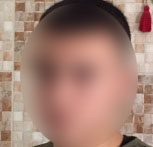Testimony: M.J.A.S.
| Name: | M.J.A.S. |
| Age: | 16 |
| Date: | 8 February 2018 |
| Location: | Al 'Arrub camp, West Bank |
| Accusation: | Throwing stones |
On 8 February 2018, a 16-year-old minor from Al 'Arrub refugee camp was detained by Israeli soldiers at noon and accused of throwing stones. He reports ill treatment and being denied his basic legal rights under Israeli military law. He reports being sentenced to 3 months in prison and fined NIS 4,000. He also received a suspended sentence.
 I was walking home at around noon when two Israeli soldiers stopped me on the main road and accused me of throwing stones. Soon two military jeeps pulled over and the soldiers showed me some photographs of clashes with soldiers and accused me of taking part. I denied that the photographs were of me.
I was walking home at around noon when two Israeli soldiers stopped me on the main road and accused me of throwing stones. Soon two military jeeps pulled over and the soldiers showed me some photographs of clashes with soldiers and accused me of taking part. I denied that the photographs were of me. The soldiers then they tied my hands to the front with three plastic ties: one on each wrist and one connecting the two. The ties were painful. The also blindfolded me. I was then put in the back of the one of the jeeps and made to sit on the metal floor.
The jeep drove to the police station in Etzion settlement where I was examined by a doctor. The doctor removed the ties and the blindfold and I complained to him that the ties and the blindfold caused me pain but he did not respond. He tied and blindfolded me again after the examination.
Then I was taken outside where two people slapped me on the head. One of them told the other I should be shot in the head. Then I was taken for interrogation. It was around 2:30 p.m.
The interrogator removed my blindfold. He was in civilian clothes and had a voice recorder on the table. He told me everything I say would be recorded. He told me his name was "Yossi" and asked me for my name and then showed me some photographs. He accused me of throwing stones without informing me of my rights. I denied the accusation. He banged the table and swore at me saying I was the “son of a whore”.
He repeated the same accusation over and over and wanted me to give names of boys who throw stones. I continued to deny the accusation and did not give any names. I was interrogated for about one-and-a-half hours. In the end he told me four soldiers had testified against me and showed me more photographs. At that point I confessed.
About an hour into the interrogation and after I had confessed I asked to see a lawyer. The interrogator called one and allowed me to speak to him. The lawyer told me not to be afraid and asked me about my court hearing. He also told me to remain silent and not to say anything and not to confess. The interrogator also called my father and allowed me to speak to him.
Then he showed me a blank piece of paper and wanted me to sign my name. When I refused to sign he yelled at me and kept insisting I had to sign. Then he told me if I signed my name he could then send me to Ofer. Then he brought another document in Arabic saying he had completed the interrogation. He asked me to sign it and I did.
Then he took my photograph and fingerprints and took me to a cell where I was searched in my underwear. About three hours later I was taken to Ofer prison, near Jerusalem. I arrived there around 9:00 p.m. At Ofer I was strip searched and taken to Section 13. I ate and went to bed.
Two days later I was taken to Ofer military court. My mother and a lawyer were present. The hearing was adjourned. I had eight hearings and at the last one I was sentenced in a plea bargain to three months in prison and fined NIS 4,000. I was also given a 15-month sentence suspended for five years. I accepted the plea bargain because I thought it was a good deal and I wanted to go back to school as soon as possible. I would have been put in prison for longer had I rejected the plea bargain.
I spent my entire sentence at Ofer where I attended mathematics and Arabic classes and did some weight lifting. My parents did not visit me in prison because their permit to visit was not issued in time. My mother made sure to attend all my hearing because that was the only time she could see me.
I was released on 23 April 2018, and I went home with my parents who had decorated the house with flags to celebrate my homecoming.





